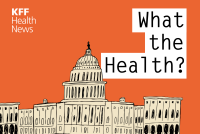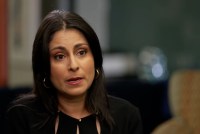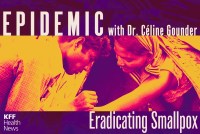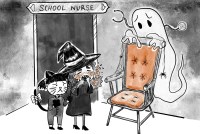KFF Health News' 'What the Health?': Democrats See Opportunity in GOP Threats to Repeal Health Law
Sensing that Republicans are walking into a political minefield by threatening once again to repeal the Affordable Care Act, the Biden administration is looking to capitalize by rolling out a series of initiatives aimed at high drug prices and other consequences of “corporate greed in health care.” Meanwhile, the Supreme Court hears a case that could determine when and how much victims of the opioid crisis can collect from Purdue Pharma, the drug company that lied about how addictive its drug, OxyContin, really was. Alice Miranda Ollstein of Politico, Anna Edney of Bloomberg News, and Rachana Pradhan of KFF Health News join KFF Health News chief Washington correspondent Julie Rovner to discuss these issues and more. Also this week, Rovner interviews Dan Weissmann of KFF Health News’ sister podcast, “An Arm and a Leg,” about his investigation into hospitals suing their patients over unpaid bills.
Readers Slam Hospital Monopolies and Blame the Feds for Understaffed Nursing Homes
California Healthline gives readers a chance to comment on a recent batch of stories.
KFF Health News' 'What the Health?': Trump Puts Obamacare Repeal Back on Agenda
Although Republicans have never united behind a replacement for the Affordable Care Act, 2024 GOP presidential front-runner Donald Trump said this week he wants to put the issue back on the national agenda. That delights Democrats, who have won at least two elections partly by defending the now-popular health law. Meanwhile, the Texas Supreme Court takes up a case brought by women who say their pregnancy complications further endangered their health due to the vagueness of Texas’ near-total ban on abortions. Joanne Kenen of Johns Hopkins University and Politico Magazine, Sarah Karlin-Smith of the Pink Sheet, and Victoria Knight of Axios News join KFF Health News chief Washington correspondent Julie Rovner to discuss these issues and more. Also this week, Rovner interviews KFF Health News’ Rachana Pradhan, who reported and wrote the latest “Bill of the Month” feature.
KFF Health News editor-at-large for public health Céline Gounder discusses how families of transgender youth are uprooting their lives due to anti-trans policies and their ripple effects.
KFF Health News' 'What the Health?': Congress Kicks the (Budget) Can Down the Road. Again.
Congress narrowly avoided a federal government shutdown for the second time in six weeks, as Democrats came to the rescue of divided House Republicans over annual spending bills that were supposed to be finished by Oct. 1. But the brinksmanship is likely to repeat itself early in 2024, when the next temporary spending patches expire. Meanwhile, a pair of investigations unveiled this week demonstrate how difficult it still is for seniors to get needed long-term and rehabilitation care. Alice Miranda Ollstein of Politico, Rachel Cohrs of Stat, and Joanne Kenen of Johns Hopkins University and Politico Magazine join KFF Health News’ Julie Rovner to discuss these issues and more.
KFF Health News' 'What the Health?': A Very Good Night for Abortion Rights Backers
Abortion rights backers won major victories in at least five states in the 2023 off-year elections Nov. 7, proving the staying power of abortion as a political issue in the wake of the Supreme Court’s 2022 decision overturning Roe v. Wade. Meanwhile, the National Institutes of Health finally has a new director, after Democrats temporarily blocked President Joe Biden’s nominee over a mostly unrelated fight about prescription drug prices. Alice Miranda Ollstein of Politico, Tami Luhby of CNN, and Sandhya Raman of CQ Roll Call join KFF Health News’ Julie Rovner to discuss these issues and more. Also this week, Rovner interviews KFF Health News’ Julie Appleby, who reported and wrote the latest “Bill of the Month” feature.
Epidemic: The Scars of Smallpox
The series finale of “Epidemic: Eradicating Smallpox” is a visit to the home of Rahima Banu, the last person with a documented case of naturally occurring variola major smallpox. When the virus was declared eradicated, she became a symbol of one of the greatest victories in global public health. What happened to Rahima Banu afterward?
KFF Health News' 'What the Health?': For ACA Plans, It’s Time to Shop Around
It’s Obamacare open enrollment season, which means that, for people who rely on these plans for coverage, it’s time to shop around. With enhanced premium subsidies and cost-sharing assistance, consumers may find savings by switching plans. It is especially important for people who lost their coverage because of the Medicaid unwinding to investigate their options. Many qualify for assistance. Meanwhile, the countdown to Election Day is on, and Ohio’s State Issue 1 is grabbing headlines. The closely watched ballot initiative has become a testing ground for abortion-related messaging, which has been rife with misinformation. This week’s panelists are Mary Agnes Carey of KFF Health News, Jessie Hellmann of CQ Roll Call, Joanne Kenen of the Johns Hopkins Bloomberg School of Public Health and Politico, and Rachana Pradhan of KFF Health News.
Medical Debt and Nurse Shortages Haunt Winning Halloween Haikus
Entries for our fifth annual Halloween haiku contest left us terrified. Based on a review by our panel of judges, here’s the winner and runners-up — plus the original artwork they inspired.
KFF Health News' 'What the Health?': The New Speaker’s (Limited) Record on Health
The House finally has a new speaker: Mike Johnson (R-La). He’s a relative newcomer who’s been a lower-level member of the House GOP leadership. And while he’s an outspoken opponent of abortion and same-sex marriage, his record on other health issues is scant. Meanwhile, the National Institutes of Health appears on track to be getting a new director, and Georgia’s Medicaid work requirement experiment is off to a very slow start. Alice Miranda Ollstein of Politico and Rachel Cohrs of Stat join KFF Health News’ Julie Rovner to discuss these issues and more. Also this week, Rovner interviews Michael Cannon, director of health policy studies at the Cato Institute, a libertarian think tank.









